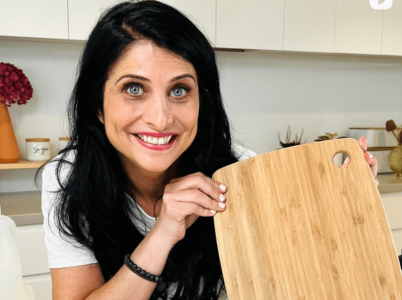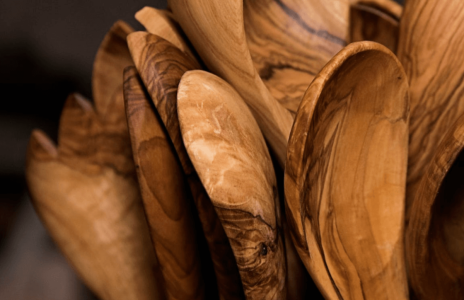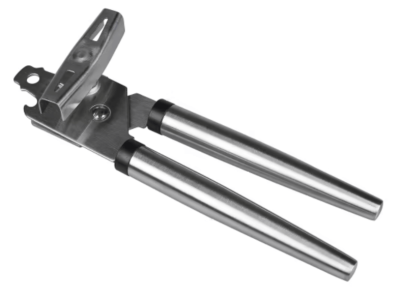These 3 items in your kitchen are full of germs – here's how to clean them!
- Replies 4
As much as we'd all like to have a spotless home, the reality is that life gets busy and things slip through the cracks. We might forget to do a load of laundry, or we might let the dishes pile up in the sink overnight. And that's okay! We're only human, after all.
But when it comes to cleaning our kitchens, we need to be on top of things because this is one room in our homes where germs can build up quickly and cause foodborne illness.
You probably already know to wash your hands thoroughly after handling raw meat, but there are other places and tools in your kitchen that harbour germs – places you might not even think about paying attention to regularly.
From chopping boards and spoons to can openers, these common kitchen items can become breeding grounds for bacteria if not properly and thoroughly cleaned.
Not sure where to start? Don't worry; we've got you covered with some simple tips and tricks from organisation expert Anita Birges. With her help, getting your kitchen back into tip-top shape will be easier – and less time-consuming – than you ever thought possible!

Chopping Boards
As part of good kitchen hygiene, always use clean cutting boards. With so many different raw ingredients passing over them, chopping boards pose a substantial threat of spreading nasty bacteria such as salmonella and E. coli.
According to Anita, you should clean them after every use and deep clean them at least once every three months. To clean a wooden board, sprinkle a generous amount of baking soda over the surface, and then squeeze the juice from half a lemon on top.
'With the remaining lemon, you're going to scrub with the lemon in small circular motions,' she explains. 'The baking soda will help pull up any of the stains or smells locked in the board, and lemon acts as a natural disinfectant.' Finish by wiping it down with a hot, wet towel and letting it dry.
If you have a plastic board, follow the same method as above but leave the bicarb soda and lemon juice mixture to sit for 10 minutes before wiping it off. You might need a scrubbing brush to get all the gunk off.
Credit: Wirecutter.
Wooden Spoons
Trees have the innate ability to fend off infection, bacteria, and mould and those attributes are preserved even after the wood has been processed into tools, making wooden spoons more hygienic than their synthetic counterparts.
Wooden spoons are a classic cooking tool that, when properly cared for, will last a lifetime; however, they can be subject to oil and grime buildup over time.
Here's how to clean them: 'All you're going to do is boil up some water, fill up a cup and leave your wooden spoon in there for a good few minutes,' Anita says. 'You're going to see all that grime and all those stains lifting out.'
After soaking the spoon, scrub it with a scourer to remove the coating of gunk that has accumulated on it, and your spoon will be as clean and fresh as it was before.
Can Opener
A can opener is one of the most helpful tools in every kitchen, but after you've used it, you probably just toss it back in the drawer without giving it another thought. (We're guilty…)
If you use a can opener that has been sitting about for a while and hasn't been cleaned, you may find it difficult to spin the gears when you need to open a can. Rust can form on the gears and the blade, making it so that they cannot turn.
Using a can opener with rust on the blade can also cause that rust to fall into your canned food, which we all know is bad news.
'I've got a great cleaning solution and all you need is some baking soda,' says Anita. 'Sprinkle it on some steel wool and give it a good scrub; it's going to come up so shiny!'
Instead of steel wool, you can also use a toothbrush to thoroughly get between the blade and gears to remove any food or grime. There are cheap toothbrushes with 'hard' bristles that make it easier to clean the 'teeth' of the gears.
Now that your kitchen tools are germ-free and sparkling clean, it's time to focus on the rest of your home. Check out the Cleaning & Home Improvement forum on the SDC website for more cleaning tips and tricks.
Do you have more cleaning tips, members? Share some of them with us in the comments below!
But when it comes to cleaning our kitchens, we need to be on top of things because this is one room in our homes where germs can build up quickly and cause foodborne illness.
You probably already know to wash your hands thoroughly after handling raw meat, but there are other places and tools in your kitchen that harbour germs – places you might not even think about paying attention to regularly.
From chopping boards and spoons to can openers, these common kitchen items can become breeding grounds for bacteria if not properly and thoroughly cleaned.
Not sure where to start? Don't worry; we've got you covered with some simple tips and tricks from organisation expert Anita Birges. With her help, getting your kitchen back into tip-top shape will be easier – and less time-consuming – than you ever thought possible!

There are three kitchen tools that Anita says people often forget to clean. Credit: Instagram/mise_en_place_aus.
Chopping Boards
As part of good kitchen hygiene, always use clean cutting boards. With so many different raw ingredients passing over them, chopping boards pose a substantial threat of spreading nasty bacteria such as salmonella and E. coli.
According to Anita, you should clean them after every use and deep clean them at least once every three months. To clean a wooden board, sprinkle a generous amount of baking soda over the surface, and then squeeze the juice from half a lemon on top.
'With the remaining lemon, you're going to scrub with the lemon in small circular motions,' she explains. 'The baking soda will help pull up any of the stains or smells locked in the board, and lemon acts as a natural disinfectant.' Finish by wiping it down with a hot, wet towel and letting it dry.
If you have a plastic board, follow the same method as above but leave the bicarb soda and lemon juice mixture to sit for 10 minutes before wiping it off. You might need a scrubbing brush to get all the gunk off.
Credit: Wirecutter.
Wooden Spoons
Trees have the innate ability to fend off infection, bacteria, and mould and those attributes are preserved even after the wood has been processed into tools, making wooden spoons more hygienic than their synthetic counterparts.
Wooden spoons are a classic cooking tool that, when properly cared for, will last a lifetime; however, they can be subject to oil and grime buildup over time.
Here's how to clean them: 'All you're going to do is boil up some water, fill up a cup and leave your wooden spoon in there for a good few minutes,' Anita says. 'You're going to see all that grime and all those stains lifting out.'
After soaking the spoon, scrub it with a scourer to remove the coating of gunk that has accumulated on it, and your spoon will be as clean and fresh as it was before.
Can Opener
A can opener is one of the most helpful tools in every kitchen, but after you've used it, you probably just toss it back in the drawer without giving it another thought. (We're guilty…)
If you use a can opener that has been sitting about for a while and hasn't been cleaned, you may find it difficult to spin the gears when you need to open a can. Rust can form on the gears and the blade, making it so that they cannot turn.
Using a can opener with rust on the blade can also cause that rust to fall into your canned food, which we all know is bad news.
'I've got a great cleaning solution and all you need is some baking soda,' says Anita. 'Sprinkle it on some steel wool and give it a good scrub; it's going to come up so shiny!'
Instead of steel wool, you can also use a toothbrush to thoroughly get between the blade and gears to remove any food or grime. There are cheap toothbrushes with 'hard' bristles that make it easier to clean the 'teeth' of the gears.
Now that your kitchen tools are germ-free and sparkling clean, it's time to focus on the rest of your home. Check out the Cleaning & Home Improvement forum on the SDC website for more cleaning tips and tricks.
Do you have more cleaning tips, members? Share some of them with us in the comments below!









